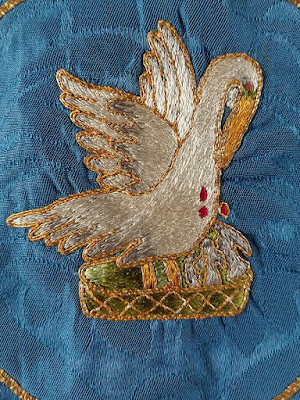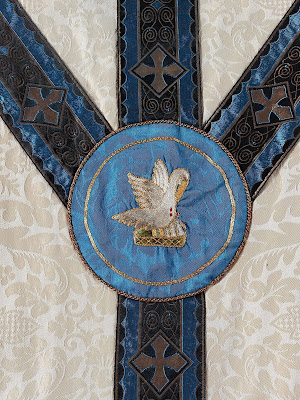Today is Corpus Christi, the Thanksgiving
for the Sacrament of Holy Communion.
A sacrament is an outward and visible
sign of an inward and spiritual grace. There are two Sacraments of the Gospels:
baptism, and communion. There are further Sacraments of the Church, including
marriage, and the anointing of the sick.
Sacraments take something of the
world (water, bread, wine, metal, oil) and recognise it as a place of encounter
with Jesus Christ (the one who is both fully human and fully God, in whom
heaven and earth are united) and so as a point at which earth and heaven come
together.
Sacraments take something temporal (bread
corrupts quickly, but even a platinum ring does not last forever) and see in it
all eternity.
Sacraments combine something given by
God to creation; and by the wider creation to humans; taken up and transformed
by human activity (the work of farmer, miller, and baker to make bread; the work
of vintner, of jeweller, of herbalist; even water comes to us via aqueducts: What
did the Romans ever do for us?) and offered once more; taken up by God—Creator, Redeemer and Sustainer of all—transformed
once more and given yet again. A circle of grace upon grace, of life-enhancing
gift upon gift, begun, continued, and brought to completion in God. The
perfection of diversity in harmony.
In the Old Testament reading set for
today, Abram (later, Abraham) returns from victory in battle, having taken back
his nephew who had been carried off in defeat, and is met by Melchizedek, king
of Salem (later, Jerusalem).
‘And King Melchizedek of Salem
brought out bread and wine; he was priest of God Most High. He blessed him and
said,
‘Blessed be Abram by God Most High,
maker of heaven and earth;
and blessed be God Most High,
who has delivered your enemies into your hand!’
‘And Abram gave him one-tenth of everything.’
Genesis 14:18-20
Melchizedek sets before Abram bread
and wine, and in this sacrament, Abram experiences strength renewing his
weariness and healing for his wounds. Some would say that in his host, Abraham
encounters the second person of the Trinity, that Melchizedek is the outward
and visible sign of God with Abraham.
Melchizedek pronounces a blessing
over Abram: ‘Blessed be Abram by God Most High, maker of heaven and earth…’ and
the blessing is deliberately expansive. The word here translated ‘maker’ can
also be rendered ‘possessor’ and encompasses both God as possessor of heaven
and earth by virtue of being its creator, redeemer and sustainer ‘[Blessed be
Abram by] God Most High, maker of heaven and earth…’ and Abram as the one who
possesses heaven and earth by virtue of being in covenant relationship with God
Most High ‘Blessed be Abram [by God Most High], possessor of heaven and earth…’].
Jesus said, ‘The thief comes only to steal
and kill and destroy. I came that they may have life, and have it abundantly.’
(John 10:10) Jesus came that we might know love, joy, peace, comfort in
our sorrows; but these gifts of heaven, these spiritual graces, can be stolen
from us in the outward and visible dimension of life, such that we grow weary
of life itself. In the sacrament of Holy Communion, Jesus, our High Priest in
the Order of Melchizedek, sets bread and wine before us, the outward sign of
his body and blood, and as we eat, our souls and bodies are nourished.
So come, those who are weary. Gaze
upon Mystery! Eat, and drink. Be made whole.
Images: detail of a pelican feeding
her chicks with her own blood, a Medieval symbol of Christ nourishing the
Church with his body and blood, embroidered on the chasuble I wore at Holy
Communion today.



No comments:
Post a Comment